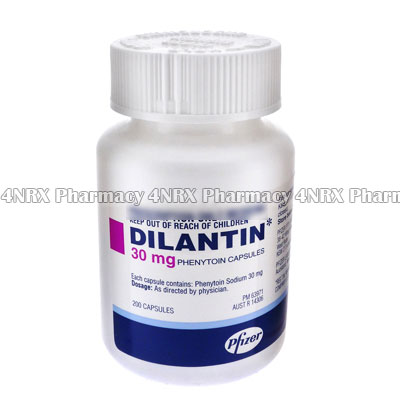 |
Home  Heart Heart  Dilantin (Phenytoin Sodium) Dilantin (Phenytoin Sodium) |
|
|||||||||
|
|
Dilantin (Phenytoin Sodium)
What is Dilantin (Phenytoin Sodium) used for? Dilantin (Phenytoin Sodium) is an anticonvulsant medication used to treat seizure disorders such as epilepsy or seizures caused by a head injury or brain surgery. It operates by preventing the rapid repeating nerve impulses in the brain that are responsible for causing seizures. This may also make it useful for treating severe pain caused by trigeminal neuralgia. Your physician may prescribe it for other unlisted purposes, as well. How should I use Dilantin (Phenytoin Sodium)? Dilantin (Phenytoin Sodium) should always be used according to your physician's instructions to get the most effective results from treatment. One tablet is typically taken two to three times each day, but your individual regimen will depend on your current health condition and the severity of your symptoms. These should be swallowed whole with a large glass of water and can be taken on an empty stomach, but a meal is recommended before use if you experience nausea. Do not alter the form of the tablets to avoid destroying or changing the effects of their contents. Ask your physician any questions you have about the medicine to ensure the correct usage. What are the side effects of Dilantin (Phenytoin Sodium)? Some patients using Dilantin (Phenytoin Sodium) have reported experiencing side effects such as:
Stop using the medication and contact your physician immediately if you experience any intense or worrying symptoms such as flu symptoms, swelling of the glands, stomach pain, chest pain, difficulty breathing, unusual swelling, tremors, severe skin reactions, darkened urine, discolored stools, or jaundice. These conditions may require alterations to your regimen to prevent further complications including lower doses, reduce frequency of administration, or emergency medical attention. Please Note Do not begin using Dilantin (Phenytoin Sodium) if you are lactose intolerant, fructose intolerant, or allergic to other similar medications. You are also suggested to disclose if you are elderly, of Thai or Han Chinese origin, if you have uremia, diabetes, porphyrias, decreased liver function, or if you consume large amounts of alcohol. These conditions may cause unexpected problems requiring alterations to your dosage or frequency of administration. Strictly follow all instructions provided to you by your physician or pharmacist while using Dilantin (Phenytoin Sodium). Optimum and safe dosage can differ based on the patient and the condition being treated. As this medication may be unsafe for certain patients, it is essential you always inform your physician if you are pregnant or breastfeeding, as well as if you have any allergies, other illnesses, or ongoing health conditions, and if you are taking any other form of medication, supplements, or herbal products. Immediately seek emergency medical care if you have an allergic or hypersensitive reaction. Common signs of a reaction include hives, swelling, skin rashes, chest pains, as well as trouble breathing or swallowing. 
|
||||||||||||||||||||||